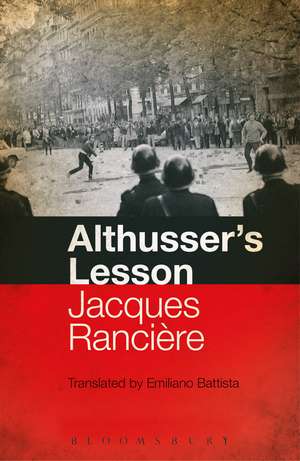Althusser's Lesson
Autor Jacques Rancièreen Limba Engleză Paperback – 22 mar 2017
Preț: 132.26 lei
Preț vechi: 144.07 lei
-8% Nou
Puncte Express: 198
Preț estimativ în valută:
25.31€ • 26.61$ • 20.91£
25.31€ • 26.61$ • 20.91£
Carte tipărită la comandă
Livrare economică 17 aprilie-01 mai
Preluare comenzi: 021 569.72.76
Specificații
ISBN-13: 9781350009110
ISBN-10: 1350009113
Pagini: 224
Dimensiuni: 129 x 198 x 20 mm
Greutate: 0.25 kg
Editura: Bloomsbury Publishing
Colecția Bloomsbury Academic
Locul publicării:London, United Kingdom
ISBN-10: 1350009113
Pagini: 224
Dimensiuni: 129 x 198 x 20 mm
Greutate: 0.25 kg
Editura: Bloomsbury Publishing
Colecția Bloomsbury Academic
Locul publicării:London, United Kingdom
Caracteristici
The first English-language translation of Jacques Ranciere's first book, in which he reflects on the status of Althusserian Marxism after the events of May 1968.
Notă biografică
Jacques Rancière taught at the University of Paris VIII, France, from 1969 to 2000, occupying the Chair of Aesthetics and Politics from 1990 until his retirement.
Emiliano Battista is the translator of Jacques Rancière's Althusser's Lesson (Continuum, 2011) and Film Fables (Berg, 2006).
Cuprins
Translator's Preface \ 1. A lesson in orthodoxy: M.L. teaches John Lewis that the masses make history \ 2. A lesson in politics: philosophers do not become kings \ 3. A lesson in self-criticism: class struggle rages in theory \ 4. A lesson in history: the damages of humanism \ 5. A discourse in its place \ 6. For the record: on the theory of ideology (1969) \ Index.
Recenzii
This precise and elegant translation of Jacques Rancière's first book will be of keen interest to those seeking to understand Rancière's thought as well as the development of French philosophy during the 1970s. It will also be of help to those working to reanimate politics through a thorough questioning of its guiding assumptions. In this short, fiery, and at points moving text, one sees Rancière's own positions begin to take root as this highly original thinker comes to grips with the legacy of his mentor, Louis Althusser. Joseph J. Tanke, University of Hawaii
... if one wishes to understand the seeds of [Rancière's significant contributions to contemporary political thought] and the times in which they were germinating, Althusser's Lesson offers as good a first-hand account as one could ask for.
'Emiliano Battista's translation is excellent: readable, judicious in its decisions, and attentive to the complex terminological terrain of the theoretical and political field into which Rancière's book intervened. The translator's notes are a helpful guide to this context.'
Rancière tells a compelling story about the political effects both deliberate and unintentional of the relationship between academic Marxist discourse, institutional left politics, and the iconic mass rebellion of nine million workers that would later be known as 'the beginning of the end' of radical French leftism...Rancière's reflections [...] open the space for a critical and politically sensitive dialogue between professors, theorists, activists, students, and workers over the political space which the university has time and time again proven itself to be. Moreover, it forces academic Marxists to consider their generally passive position in relation to these protests.
A lesson, like a letter, is delivered to someone, to a recipient ... in a specific time and place and, in written form, may like a letter be delayed, so delayed in fact that it misses the addressee...Sometimes a letter does reach its destination.
... if one wishes to understand the seeds of [Rancière's significant contributions to contemporary political thought] and the times in which they were germinating, Althusser's Lesson offers as good a first-hand account as one could ask for.
'Emiliano Battista's translation is excellent: readable, judicious in its decisions, and attentive to the complex terminological terrain of the theoretical and political field into which Rancière's book intervened. The translator's notes are a helpful guide to this context.'
Rancière tells a compelling story about the political effects both deliberate and unintentional of the relationship between academic Marxist discourse, institutional left politics, and the iconic mass rebellion of nine million workers that would later be known as 'the beginning of the end' of radical French leftism...Rancière's reflections [...] open the space for a critical and politically sensitive dialogue between professors, theorists, activists, students, and workers over the political space which the university has time and time again proven itself to be. Moreover, it forces academic Marxists to consider their generally passive position in relation to these protests.
A lesson, like a letter, is delivered to someone, to a recipient ... in a specific time and place and, in written form, may like a letter be delayed, so delayed in fact that it misses the addressee...Sometimes a letter does reach its destination.
























